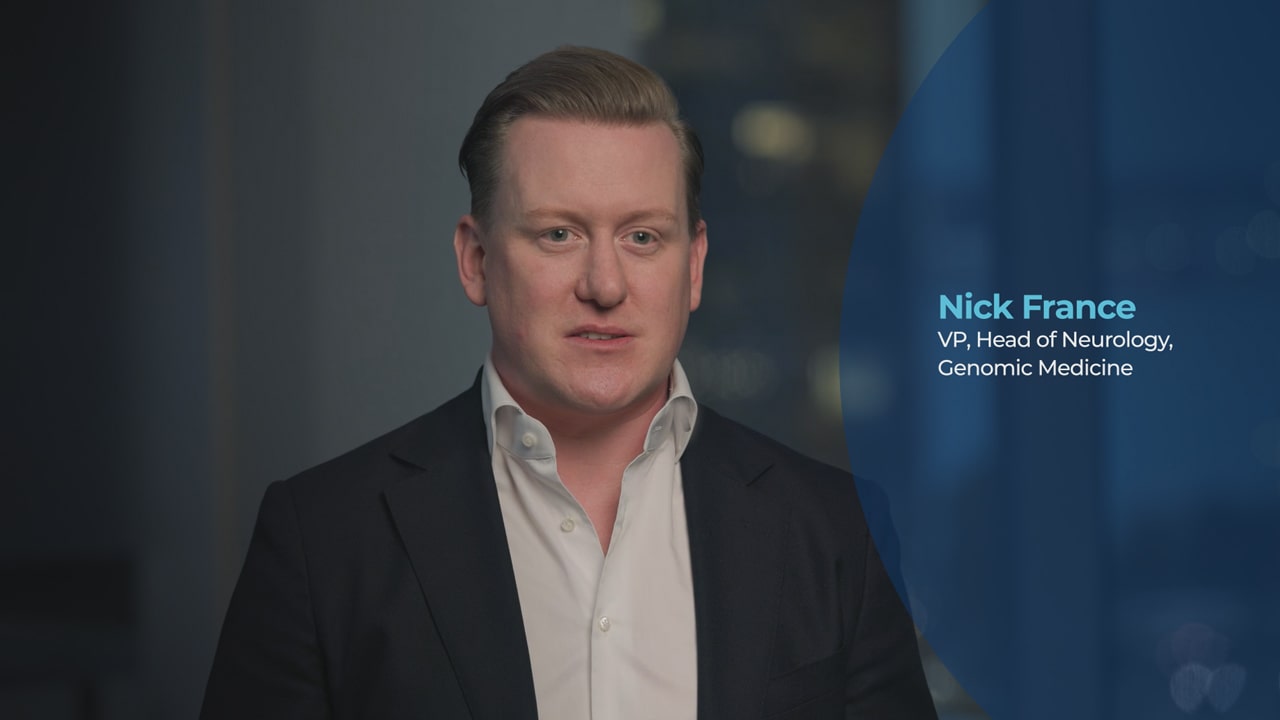- Home
- News Centre Resources
- Getting to know Nick France, an Alexion R&D Leading Voice
Getting to know Nick France, an Alexion R&D Leading Voice

To create meaningful advances in rare disease research, it takes an innovative culture, strong collaboration, and a patient-centric vision for delivering transformational solutions. At Alexion, these pillars are important to successfully develop impactful medicines for patients. We spoke with Nick France, Vice President and Therapeutic Area Head for Neurology and Genomic Medicine, about his desire to make a difference for children with rare diseases and how we are at a nexus of incredible technologies with the potential to unlock transformative medicines for patients.
What is your role at Alexion?
As Therapeutic Area Head for Neurology and Genomic Medicine, I oversee our teams of physicians and scientists across multiple disease areas who work every day to move programs through all phases of clinical development to approval.

What led you to rare disease research?
My journey into rare diseases began as a pediatrician working in a critical care unit. I was astounded by the disparity between children who were admitted with chronic diseases, for which there were approved therapies, and children with rare diseases, for which there were no treatments.
I wanted to help solve this problem, so I considered academic research, but realized the biopharmaceutical ecosystem would present the best opportunities for me to make an impact on a global level. I’ve had roles at a large pharmaceutical company developing rare disease research programs, as well as at emerging biotechs building organizations from the ground up. I’m excited to be at Alexion where I continue to be part of this exciting global ecosystem where I believe we can have a big impact on patients' lives.
What’s ahead in rare disease research & development (R&D)?
We have this fantastic opportunity to use an expanding toolbox of therapeutic modalities to unlock transformative medicines for patients.
When I think about the future—and what could be a transformative therapy for patients, even potentially curative—I look at how far we've come as an industry in terms of gene editing, gene therapies, and advanced biologics. We have incredible technologies at our fingertips for doing things that we could only have dreamed of 20 years ago. I’m thrilled to see the potential impact for patients as we follow science and further develop and deploy these technologies with the aim to deliver the best possible results for them.
Why are you proud to work at Alexion?
What really motivates me every day is looking back on where I started as a physician and the rare disease patients that I saw in the clinic who had no treatment options at the time. I look at where we are now, how much progress has been made for some of those patients, and how much more work is left. It is incredibly motivating to come to work every day with the most innovative technologies, incredible scientists, and wonderful collaborators and coworkers. We come together on these projects with the patient in mind.
It has been inspiring to play a role in Alexion's patient-centric approach to drug development. We have a very robust framework in place to ensure that patient insights and touch points are incorporated at multiple points along the journey of developing a new medicine: from entering into the early science to understand the unmet need, to understanding the impact of being in a clinical trial. This approach is essential as we aim to deliver impactful medicines that are meaningful to patients.
What I'm even more proud of is our vision and ambition for the future. There are 10,000 known rare diseases, and over 90% of them don't have approved treatments. We are focused on leading the next wave of innovative medicines and bringing new transformative options to rare disease patients.
Learn more about our innovative culture in our Featured Articles and explore scientific career opportunities at Alexion.
Share This Page
More articles you may like

Article • February 03, 2026
Pioneering new possibilities for the rare disease community
Rare Disease Day unites communities to drive strategies, funding, diagnosis and treatment, connecting local and global efforts for earlier, equitable care.

Clinical Trials • October 28, 2025
Shaping the future of R&D with real world insights into rare disease
Studying a rare disease often involves working with fragmented information, much like piecing together scattered pages of different books, each offering part of the story but rarely forming a complete picture. Researchers face this challenge due to small, often underdiagnosed, patient populations and limited understanding of how these diseases progress over time.

Diagnostics • September 17, 2025
Genomic Innovation to Support Newborn Screening of Rare Diseases
Today, while more than 10,000 rare diseases are known, recommended newborn screening panels cover only about 40 core conditions. This gap underscores the need for innovative approaches to expand the reach of newborn screening.

Thought Leadership • June 11, 2025
Paving Regulatory Pathways in Rare Disease
Many rare disease medicines are often a first of their kind, and a clear roadmap for their development and approval does not exist. Navigating the complex and sometimes unprecedented regulatory environment for rare disease requires innovation, collaboration and a patient-first mindset.

Media [News] • April 10, 2025
Advancing Rare Disease Research Through Patient-Centric Trial Design
As Head of Development, Regulatory and Safety at Alexion, Gianluca Pirozzi channels his life’s experience with rare disease to inform his work at Alexion, ensuring clinical programmes are fueled by a patient-focused mindset.

Patient Support • February 05, 2025
Addressing the Unmet Needs of the Amyloidosis Community
We spoke with Cristina Quarta, Executive Medical Director, about a group of rare diseases known as amyloidosis, the medical needs within this community and how her work as a cardiologist shapes her approach to research and development (R&D) for rare cardiac conditions.

Patient Support • September 23, 2024
Shortening the Path to Diagnosis in Rare Disease
With 10,000 known rare diseases defined today, the path to diagnosis can often resemble a puzzle, with physicians as detectives searching for clues. Many physicians never encounter a rare disease beyond the pages of their medical school textbooks.

Patient Support • June 25, 2024
Getting to know Chathuri Daluwatte, an Alexion R&D Leading Voice
Artificial Intelligence (AI) is rapidly advancing and has the potential to have a transformative impact on clinical research and development (R&D).

Research and Development • June 08, 2024
Getting to know Seng Cheng, an Alexion R&D Leading Voice
There is a sense of urgency that underlies research in rare diseases, because these diseases are often rapidly progressive.
Veeva ID: INT/NP/0036
